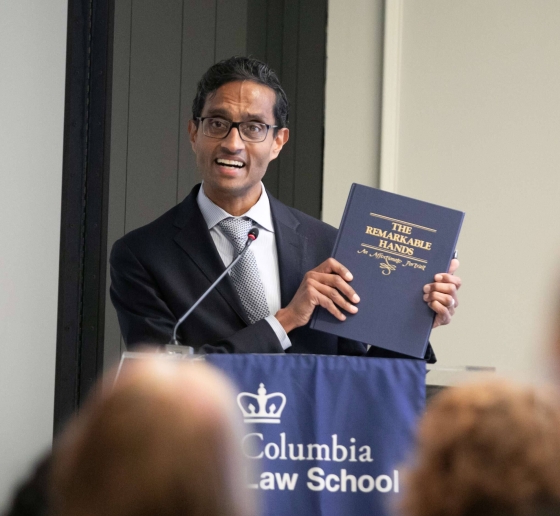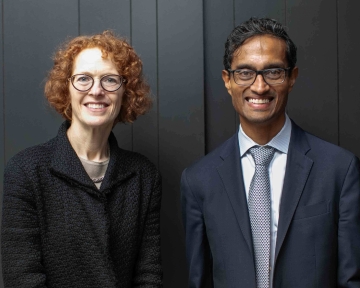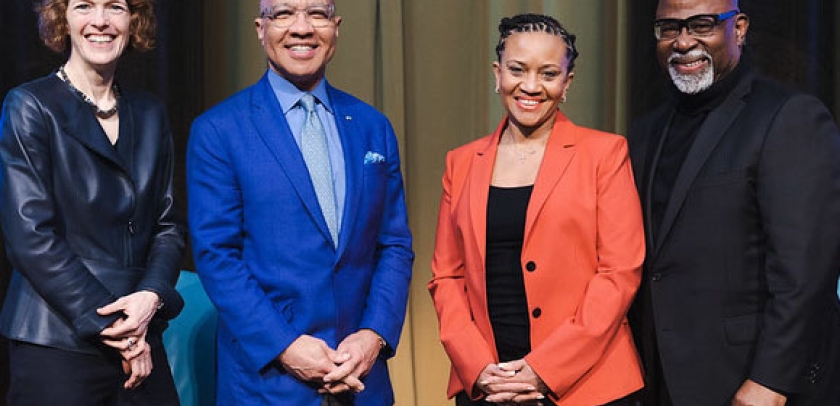Judge Arun Subramanian ’04 Delivers Keynote at Ninth Annual Alumni of Color Event
The first judge of South Asian descent in the Southern District says “representation matters” to encourage students of color in the law.

U.S. District Judge Arun Subramanian ’04 recently welcomed to his courtroom in the Southern District of New York a group of high school students of color who were seeking advice for an upcoming moot court competition.
Their excitement at meeting him—the first judge of South Asian descent in the District—was palpable, Subramanian recalled during his remarks at Columbia Law School’s annual Alumni of Color Talk and Reception. “The kids told [their coach] how excited they were to see someone on the bench who looked like them,” he said. “And I get it. Because as a kid from a different background, it's easy to feel like an outsider looking in.”
Subramanian told the audience of more than 100 alumni, faculty, and students at the January 25 event, held at the Andaz in midtown Manhattan, to appreciate how much impact they have as mentors. “Every one of you has someone in your life who has looked up to you, and who is just as excited as those kids in my courtroom to see a leader in the field of law who is like them—because it makes them believe that they are not outsiders,” he said. “Representation matters.”
Subramanian, who was confirmed to the federal bench in March 2023, spoke about his impressions of the District, including the fact that while many prominent cases are tried there, the cases that don’t make headlines are given the same considered attention.
“I see, looking around my court, distinguished lawyers who could be doing anything in the profession [and] making millions of dollars,” Subramanian said. “But [they] have chosen instead to spend every day and a lot of nights trying their hardest to reach the fair and just result in even the smallest of cases.”
That care “makes a real difference,” he added. “Not just for the litigants themselves but in the public's understanding that there is a forum to be heard in this country, even for the outsiders in our society—which is not the case in many places around the world.”
A former partner at Susman Godfrey, Subramanian clerked for Supreme Court Justice Ruth Bader Ginsburg ’59 and said that his decision to pursue being a judge came just after her death in 2020, as he stood with other former clerks outside the Supreme Court, where Ginsburg lay in repose. “I wouldn't be here if it weren’t for the Justice,” he said. “For that and everything else, I am forever in her debt.”
Subramanian, whose parents immigrated to the U.S. from India a few months before his birth in 1979, cited Ginsburg’s often-quoted remark that the difference between a bookkeeper in the Garment District (as Ginsburg’s mother was) and a Supreme Court justice was simply one generation.
“Everyone in this room has a similar story that underscores the possibilities and the progress that can be achieved in just a single generation in America,” he said.
A Judicial Top 10
In the style of former TV talk-show host David Letterman, Subramanian also entertained the audience with a list of “Top 10 Things I Didn’t Expect About Life on the Southern District.” Among the little-known facts he shared:
You have to buy your own robe. Subramanian ordered his online, to the dismay of his clerks. “The robe I got would be too long if I were six foot five, and it has billowing sleeves. It's more of an evening gown. Whenever we have a hearing, my clerks ask me if I'm going to put my gown on, which I think is their way of suggesting that maybe I should go and get something a little bit more tailored.”
Judges love karaoke. As “the new kid” on the court, Subramanian hosted a karaoke event, the first in the District’s 235-year history. “[Judge] James Duane didn't have a karaoke happy hour, but I did. And I have to say, I did not know that there was so much enthusiasm for karaoke at the Mother Court. … Hopefully, a tradition that will live on for decades.”
Check your monogram. “Inside the court, judges go by their initials,” Subramanian said. “Which raised an issue for me because my middle initial is S. ‘Chambers of A.S.S.’ doesn't have a great ring to it. I very quickly had to stop using my middle initial.”
Supporting Future Students of Color

In her remarks welcoming the audience, Gillian Lester, Dean and Lucy G. Moses Professor of Law, took the opportunity to reflect on the origins of the Alumni of Color Talk and Reception, which was first held in 2016, early in Dean Lester’s tenure leading the Law School. Nine years later, the event, which celebrates the leadership and accomplishments of Columbia Law’s alumni of color, has become “an institution for us and something to look forward to every year,” Dean Lester said. “I feel tremendous gratitude to all of you in this community for having given it instantiation and meaning,” she continued. “What an honor I will feel passing the torch.” Dean Lester announced in November 2023 that she will step down from leadership in 2024.
She also celebrated the creation of the Eric H. Holder Jr. Scholarship Fund, established by George W. Madison ’80 and other donors following the first Alumni of Color gathering and now valued at $1.2 million, adding that student financial aid is critical to making a Columbia Law education possible for students regardless of socioeconomic background.
Dean Lester noted that this year’s Alumni of Color event was the first since the Supreme Court decision on race-conscious admissions in higher education.
“Fostering a diverse learning community in higher education and in law school, I say with something of a somber note, has never been more important,” she said. “It requires a redoubled commitment to ensuring that students of color know that they are integral to the fabric of our community and know that they belong at Columbia Law School.”
The court decision “makes very clear that schools can continue to pursue their overall objectives,” Dean Lester said. “Our overall objective, deep in our bones, deep in our DNA, is to have a diverse community. Nothing about that decision changes that commitment.”
